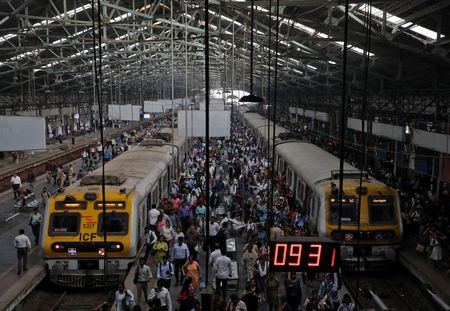By Siddhi Nayak
MUMBAI (Reuters) -India could find it challenging to meet the fiscal deficit target of 4.5% of GDP in 2025-26, an analyst at Fitch Ratings said on Wednesday.
Fitch has a BBB- rating on India with a ‘stable’ outlook.
The government’s budget gap, which hit a high of 9.5% of GDP in 2020/21 as the COVID-19 pandemic brought the economy to a halt, has narrowed since but remains well above the medium-term goal of 4.5% by 2025/26.
“Essentially, it (the fiscal glidepath) implies further consolidation of about 0.7% of GDP for each of the following two fiscal years,” Jeremy Zook, director for Asia Sovereign Ratings at the global rating agency, told Reuters.
“If we look at the recent trend, it seems like it would be a bit more difficult to achieve that level of deficit reduction.”
Global economic headwinds, geopolitical risks and high commodity prices could potentially pose risks to the government’s fiscal math, Fitch’s Zook said.
Earlier in the day, an official at Moody’s Investors Service also said the government’s fiscal deficit target for 2025/26 could see some risks.
The current pattern of fiscal deficit reduction suggests that perhaps there could be some upward pressure on expenditure, especially if the government continues with its focus on capex, said Moody’s senior vice president, Christian de Guzman.
Significant rises in commodity prices “could lead to some renewed pressure to maintain subsidies that are at a higher level in an election year,” Zook said, adding that it could lead to some fiscal slippage and higher borrowing costs for the government.
The ruling Bharatiya Janata Party faces elections in key states this year and a national vote in 2024.
Since taking office in 2014, Prime Minister Narendra Modi has ramped up capital spending including on roads and energy.
Still, India continues to have gaps in infrastructure, reducing which should be positive for medium-term growth, Zook said, pegging the country’s GDP growth at 6.2% for 2023-24.
(Reporting by Siddhi Nayak; Editing by Savio D’Souza, Dhanya Ann Thoppil and Shinjini Ganguli)

